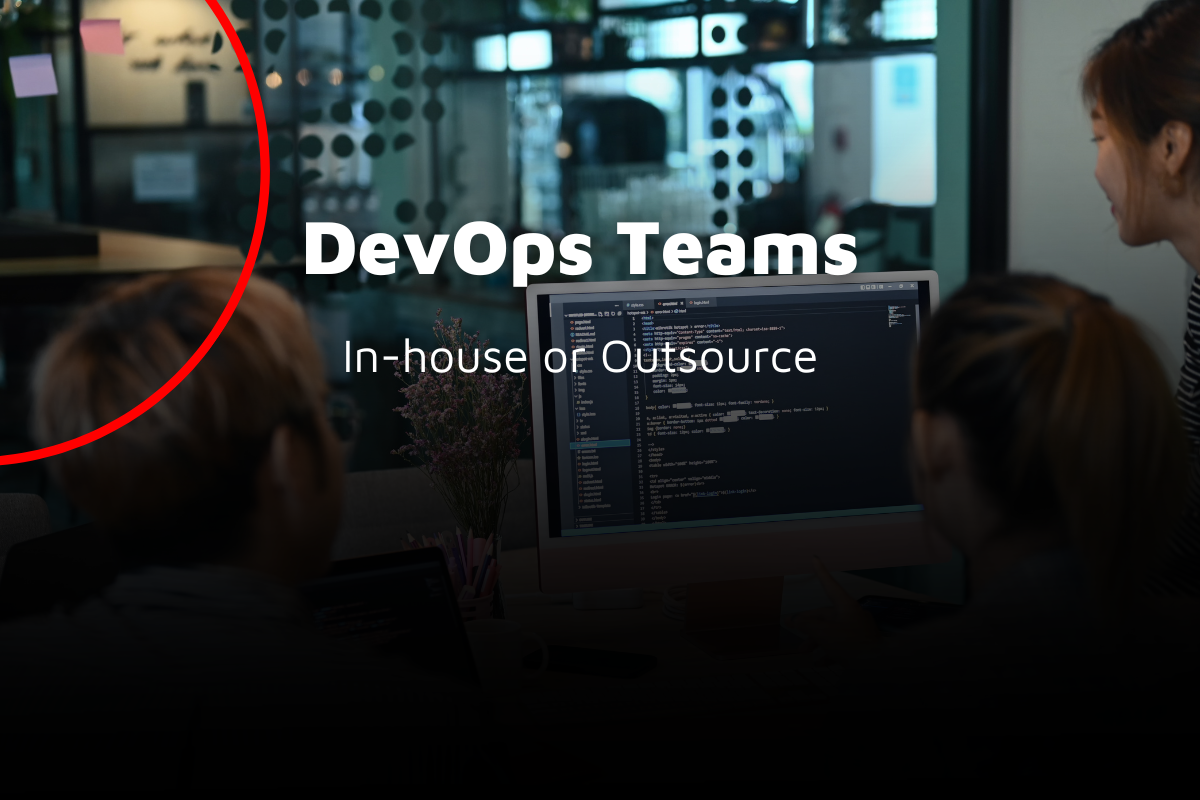Building a team of DevOps Engineers – in-house or outsource
17 March 2023 | Noor Khan

According to the Accelerate 2022 State of DevOps report, DevOps professionals were the second most in demand when it came to tech skills. However, only 11% of DevOps professionals are considered highly skilled. This poses a challenge for organisations looking to leverage DevOps to reduce their go-to-market, improve efficiencies and deliver software excellence. With a clear skills shortage in DevOps, outsourcing is possibly the best alternative to recruiting in-house.
In this article, we will look at building a team of DevOps engineers and whether you should go for the in-house or the outsource approach depending on your business needs and requirements.
Why you should build a team of DevOps engineers?
DevOps empower organisations to improve customer satisfaction, launch software products with speed and achieve organisational agility. There are many benefits, however, it can be challenging to build a team of highly skilled DevOps engineers that are ‘experts’ in the field. The following are the most common approaches to consider.
Pros of recruiting DevOps engineers in-house
- Understanding of business goals, objectives and culture is embedded within the employees
- One of the core principles of DevOps is collaboration and this is made easier and simpler if all your tech team are in-house, in the same location
- The learnings and development stay in-house to apply learnings to future projects
- Can be a real asset to the business if you are able to retain your DevOps engineers over a longer period of time
Cons of recruiting DevOps engineers in-house
- Can be challenging to hire highly skilled DevOps engineers as there is a skill shortage
- Can be a time-consuming process to source, recruit, train and retain in-house DevOps engineers
- It will require significant cost to find the right candidates and to recruit (pay salary), especially because they are in demand and the market is the DevOps engineer’s favour
Pros of outsourcing DevOps
- One of the biggest reasons why organisations will outsource is to reduce costs, which makes it the biggest incentive for outsourcing, and this is no different when it comes to outsourcing DevOps
- Immediate access to highly skilled experts, without the lengthy process of recruitment and the costs incurred during the process
- Avoid licensing fees as the outsourcing provider should have licenses to leverage leading DevOps technologies such as Azure DevOps, Docker, Ansible, Pager Duty and more
- Experience and learnings from previous projects can help you avoid costly mistakes when it comes to DevOps
- Vendors provide the DevOps culture with the core principles such as communication, collaboration and automation embedded in their DevOps processes
- Reduce risk as you are able to be selective with DevOps providers. If there is a particular engineer who is not a good fit for your team, they can easily provide another, which can be tricky if you are recruiting an in-house team.
- DevOps requires continuous learning to ensure up-to-date practices which require ongoing research, training and development. Another cost that you can save if you outsource.
Cons of outsourcing DevOps
- Harder to implement DevOps culture if your DevOps engineers are not physically part of your in-house team, however, you can easily overcome this through regular communication (daily stand-ups and frequent reports) and collaboration.
- You do not have access to third-party DevOps engineers as you do with your in-house team who are dedicated to your company and projects alone. Therefore, if you are a larger company it might be ideal to recruit.
- If your ability to launch the software to market with speed and ensure continuous improvement is vital to your organisation and will be going forward, it might be more suitable for your to build your team in-house.
The middle ground – managed DevOps services
If you are unsure of which approach to consider and are looking for a middle ground, consider managed DevOps services. With this method, you can work with DevOps engineers of your choosing that are hired by the vendor. The greatest benefit of this is that those DevOps engineers who will be dedicated to you can still reap the benefits of outsourcing without having to worry about the challenges.
Your DevOps, powered by Ardent
At Ardent, our culture aligns with the DevOps core pillars such as collaboration, communication, consistency and automation to ensure our client's expectations are met and exceeded. We have worked with multiple clients on an ongoing basis to continuously improve and evolve their software products. Explore the software product evolution of a logistics software provider spanning over a decade of collaboration and innovations:
Get in touch to find out more or find out how to optimise your DevOps processes.
Ardent Insights

Are you ready to take the lead in driving digital transformation?
Digital transformation is the process of modernizing and digitating business processes with technology that can offer a plethora of benefits including reducing long-term costs, improving productivity and streamlining processes. Despite the benefits, research by McKinsey & Company has found that around 70% of digital transformation projects fail, largely down to employee resistance. If you are [...]
Read More... from Building a team of DevOps Engineers – in-house or outsource

Stateful VS Stateless – What’s right for your application?
Protocols and guidelines are at the heart of data engineering and application development, and the data which is sent using network protocols is broadly divided into stateful vs stateless structures – these rules govern how the data has been formatted, how it sent, and how it is received by other devices (such as endpoints, routers, [...]
Read More... from Building a team of DevOps Engineers – in-house or outsource

Getting data observability done right – Is Monte Carlo the tool for you?
Data observability is all about the ability to understand, diagnose, and manage the health of your data across multiple tools and throughout the entire lifecycle of the data. Ensuring that you have the right operational monitoring and support to provide 24/7 peace of mind is critical to building and growing your company. [...]
Read More... from Building a team of DevOps Engineers – in-house or outsource






